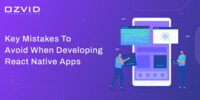- Mar 12, 2024
- Digital Marketing
- 11247
Share this post on:
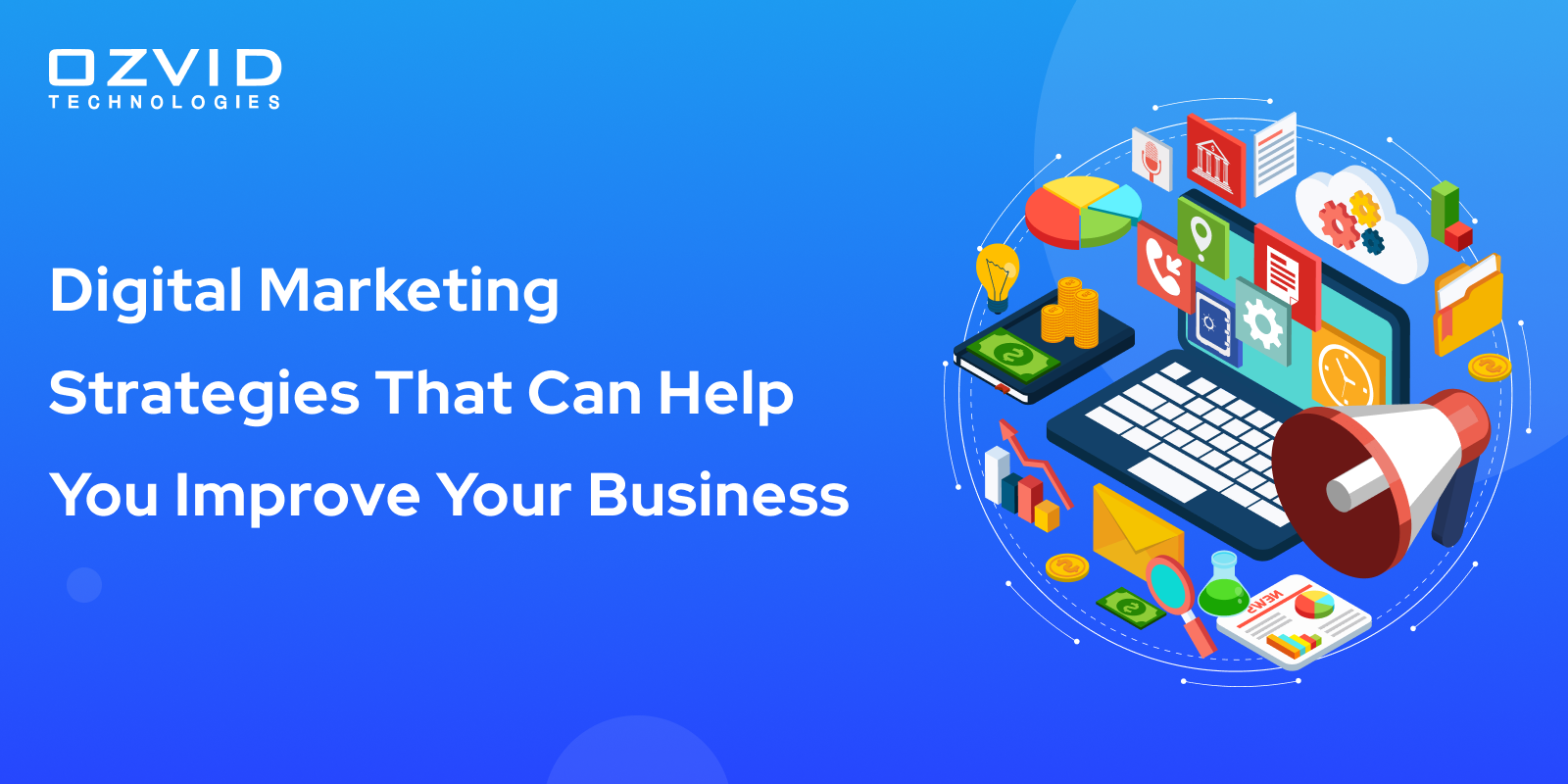
With the rise of the internet and mobile devices, companies have access to a pool of potential customers who spend most of their time online. Hence, to stay ahead of the competition, businesses need to develop effective digital marketing strategies that can help them reach and engage these customers.
Let us explore several proven digital marketing strategies that can help improve your business. From creating a professional website to leveraging email marketing and paid advertising, these strategies will help you build a stronger online presence and attract more customers to your business. Let's dive deeper into each strategy and see how it can benefit your company.
Digital Marketing Strategies for Improving Your Business
Here are some effective digital marketing strategies that can help improve your business:
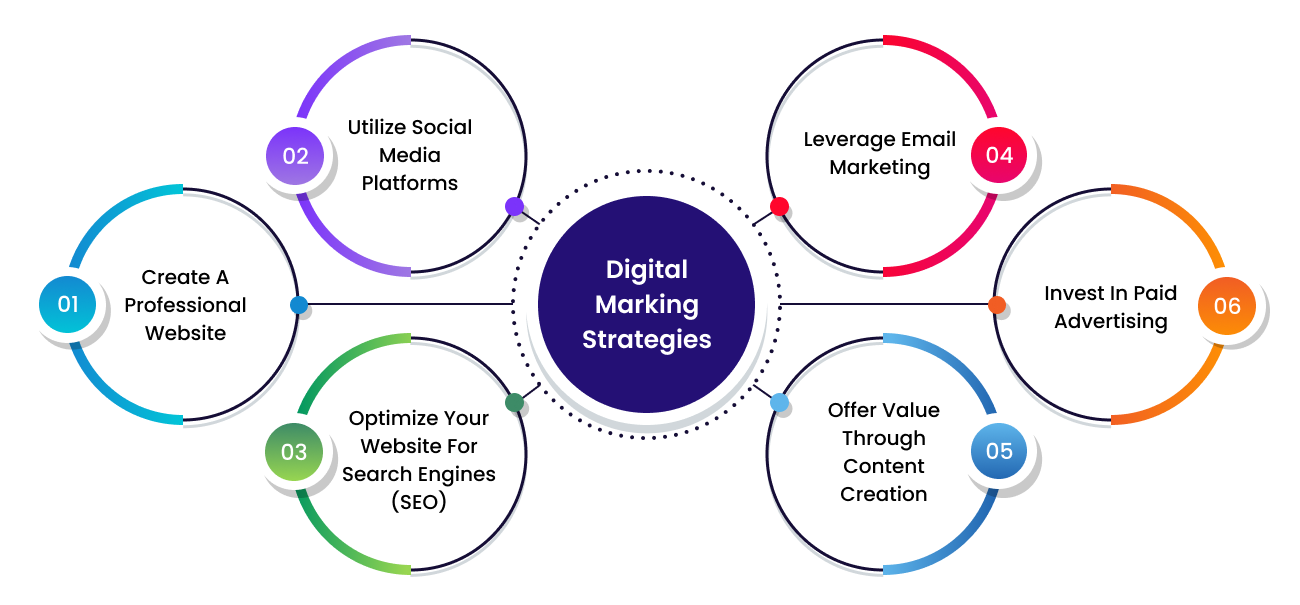
Create a professional website: Having a well-designed website is critical for establishing credibility and attracting new clients. Make sure your site is easy to navigate, visually appealing, and provides valuable content to visitors.
Utilize social media platforms: Social media sites like Facebook, Instagram, Twitter, LinkedIn, etc., provide excellent opportunities to connect with potential customers and promote your brand. Regularly posting engaging content such as blog posts, images, videos, and updates can help increase visibility and drive traffic to your website.
Optimize your website for search engines (SEO): Search engine optimization (SEO) involves optimizing your website's content and structure to rank higher in organic search results. This helps attract more targeted traffic to your site through relevant keywords related to your products or services.
Leverage email marketing: Email marketing allows you to directly reach out to subscribers with personalized messages promoting your offerings. By building relationships with your audience over time, you can convert them into loyal customers.
Offer value through content creation: Creating high-quality content such as blog articles, infographics, webinars, podcasts, etc., not only educates your audience but also positions your brand as an industry expert. Sharing this content across multiple channels increases exposure and drives traffic back to your website.
Invest in paid advertising: Paid advertising options like Google AdWords, Facebook ads, and Instagram sponsored posts allow you to target specific audiences based on demographic data. These campaigns can generate immediate traffic and sales by showcasing your product or service to interested individuals.
Mistakes to Avoid While Developing Digital Marketing Strategies
Here are a few mistakes to avoid while developing digital marketing strategies:
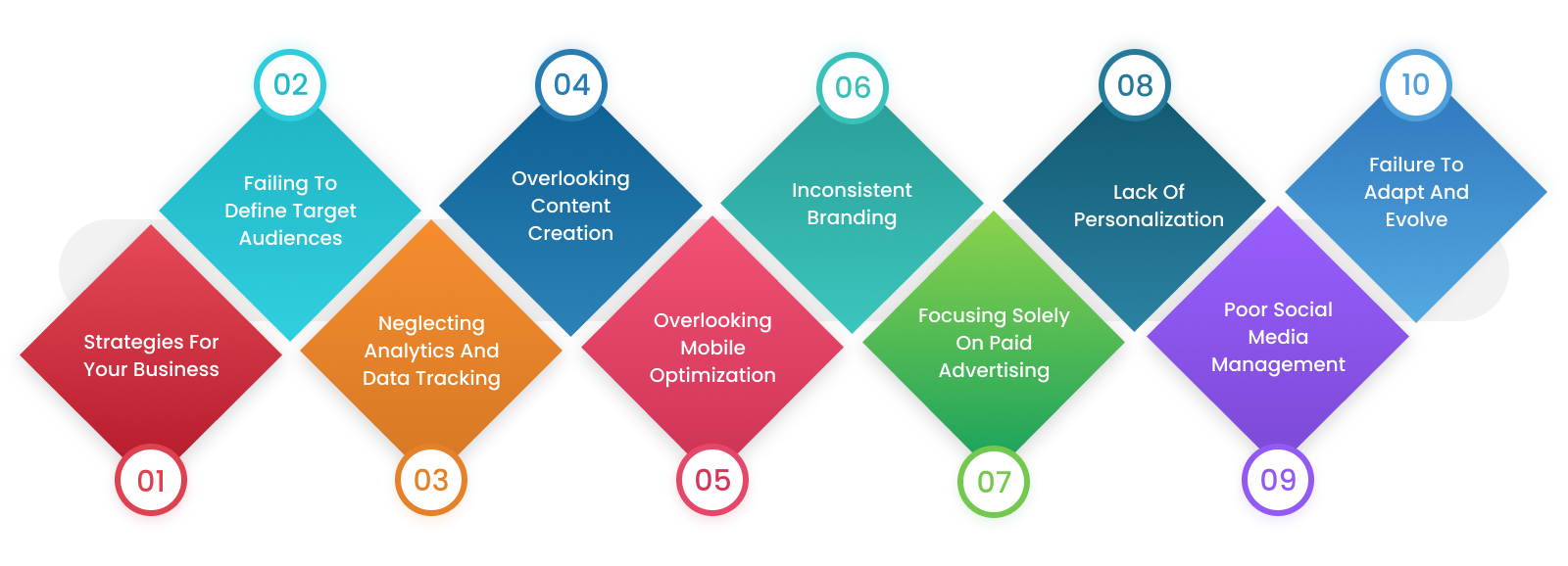
Strategies for Your Business: Developing a comprehensive digital marketing strategy is vital for achieving long-term growth and success for your business. However, without proper planning and execution, even the best intentions can lead to costly errors that hinder your progress. In this article, we will discuss common mistakes made during the development process and provide tips on how to avoid them.
Failing to Define Target Audiences: One of the biggest mistakes businesses make when crafting their digital marketing strategy is neglecting to define their target audiences. Without understanding who your ideal customers are, it becomes challenging to create messaging and content that resonates with them. Take the time to research your buyer personas and identify key characteristics such as age, gender, interests, location, job title, income level, education, etc. Use this knowledge to inform your overall strategy and tailor your message accordingly.
Neglecting Analytics and Data Tracking: Tracking analytics and metrics is essential for measuring the effectiveness of your digital marketing efforts. Ignoring data tracking can result in wasted resources and missed opportunities to refine your strategy. Set up tools like Google Analytics to monitor website traffic, conversion rates, bounce rates, and other important metrics. Review your data regularly to gain insights into which campaigns perform well and where improvements are required. Use this information to adapt your strategy and maximize ROI.
Overlooking Content Creation: Content remains king in the realm of digital marketing. Companies often underestimate the importance of producing quality content that addresses the needs and pain points of their target audience. Poor content negatively impacts user experience, damages brand reputation, and reduces chances of ranking well in search engines.
Overlooking Mobile Optimization: With the increasing use of smartphones and tablets, optimizing your digital marketing strategies for mobile devices is no longer optional but essential. Mobile optimization involves ensuring that your website, emails, ads, and other digital assets are responsive and user-friendly on mobile devices. Neglecting mobile optimization can lead to a poor user experience, high bounce rates, and missed opportunities for conversions. It is crucial to prioritize mobile responsiveness and design your digital marketing campaigns with a mobile-first approach.
Inconsistent Branding: Maintaining consistent branding across all digital marketing channels is vital for building brand recognition and trust. Inconsistency in messaging, visual elements, or tone of voice can confuse your audience and dilute your brand's identity. It is important to establish brand guidelines and ensure that they are followed consistently across all digital marketing platforms. This includes using consistent logos, colors, fonts, and messaging that align with your brand's values and personality.
Focusing Solely on Paid Advertising: While paid advertising can be an effective way to reach a wider audience quickly, relying solely on paid advertising without considering other digital marketing channels can be a mistake. Organic channels like content marketing, social media marketing, email marketing, and search engine optimization can provide long-term benefits and help build a loyal customer base. A well-rounded digital marketing strategy should include a mix of both paid and organic channels to maximize reach and engagement.
Lack of Personalization: In today's digital landscape, customers expect personalized experiences and relevant content tailored to their needs and preferences. Failing to personalize your digital marketing efforts can lead to disengagement and loss of potential customers. By leveraging customer data, segmentation, and automation tools, you can deliver personalized messages, offers, and recommendations that resonate with your audience. Personalization helps businesses improve customer satisfaction, conversion rates, and customer loyalty.
Poor Social Media Management: Social media platforms have become powerful channels for businesses to connect with their target audience, build brand awareness, and drive engagement. However, poor social media management can do more harm than good. Inconsistent posting schedules, lack of engagement with followers, or inappropriate content can damage your brand's reputation. It is crucial to develop a social media strategy that aligns with your overall digital marketing goals, create engaging content, interact with your audience regularly, and monitor social media conversations about your brand.
Failure to Adapt and Evolve: Digital marketing is a dynamic field that constantly evolves with new technologies, trends, and consumer behaviors. Failing to adapt and evolve your digital marketing strategies can result in stagnation or being left behind by competitors. It is vital to stay updated with the latest industry trends, experiment with new strategies or platforms, and continuously optimize your campaigns based on data-driven insights.
Tips That Will Help You Choose The Best Digital Marketing Services
The world of digital marketing services is vast and complex, offering various solutions designed to enhance your online visibility and drive conversions. Choosing the best service provider can be hard, especially if you lack experience in navigating the digital field. Hence, follow these steps to increase your chances of finding a reliable partner that delivers results.
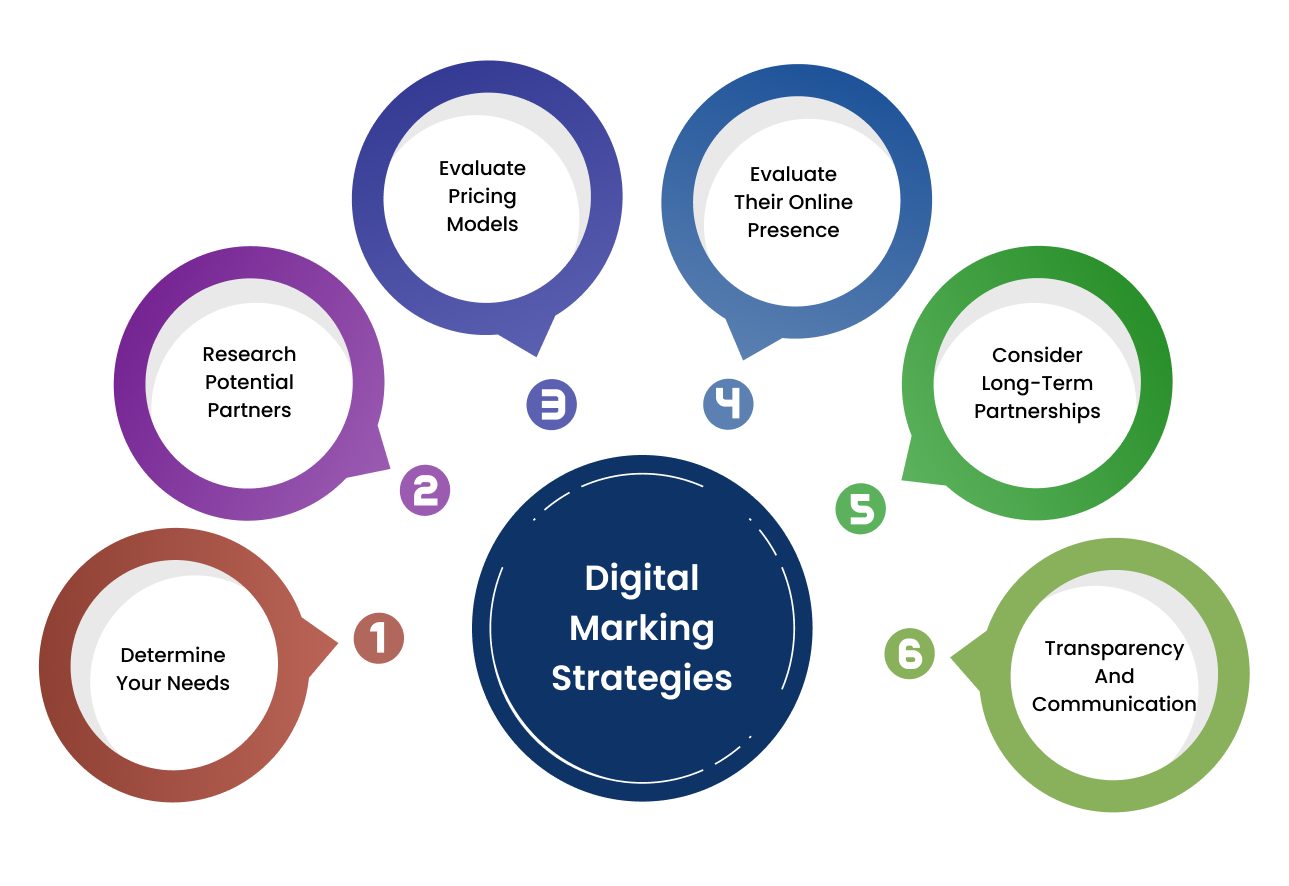
Determine Your Needs: Before starting your search for digital marketing services, take some time to assess your business requirements. Identify your primary objectives, such as increasing website traffic, generating leads, enhancing brand recognition, or optimizing social media presence. Understanding your priorities helps narrow down the selection criteria and ensures you choose a service provider that meets your specific needs.
Research Potential Partners: Once you know what you require from a digital marketing service, begin researching potential partners. Look for agencies or freelancers specializing in areas relevant to your business goals. Check their portfolios, case studies, testimonials, and reviews from previous clients. Assess their communication skills, responsiveness, and willingness to work closely with you throughout the project.
Evaluate Pricing Models: Pricing models vary among digital marketing services providers. Some charge flat fees per project or hourly rates, while others offer monthly retainer packages. Consider your budget constraints and determine which pricing model works best for your organization. Be cautious of low-cost offers that may compromise quality or include hidden costs later on.
Evaluate Their Online Presence: A reputable digital marketing agency should have a strong online presence. Evaluate their website, social media profiles, and content marketing efforts. Are they practicing what they preach? Do they have an engaging website with high-quality content? Are they active on social media platforms? An agency that excels in its digital marketing efforts is more likely to deliver results for your business. Look for signs of thought leadership, industry recognition, and a consistent brand image across their online platforms.
Consider Long-Term Partnerships: Digital marketing is an ongoing process that requires continuous optimization and adaptation to changing market trends. Therefore, it is advisable to choose an agency that is willing to establish a long-term partnership with your business.
Building a long-term relationship with a digital marketing agency allows them to gain a deep understanding of your business, target audience, and industry. They can then tailor their strategies accordingly and provide ongoing support to help you achieve your goals.
Transparency and Communication: Transparency and effective communication are crucial factors to consider when choosing a digital marketing agency. A reliable agency should be transparent about its strategies, methodologies, and reporting processes.
Ask potential agencies about their reporting practices. Will they provide detailed reports on key performance indicators (KPIs) and metrics? How often will they communicate with you? Clear communication channels are essential for a successful partnership.
Furthermore, inquire about the agency's team and their expertise. Digital marketing is a dynamic field that is constantly changing, and new techniques or strategies are evolving daily. Ensure that the agency has a team of skilled professionals who are knowledgeable in their respective areas of expertise.
Conclusion
In conclusion, developing a successful digital marketing plan requires careful consideration of different strategies tailored to meet the unique needs of your business. Whether you want to create a professional website, optimize your SEO efforts, leverage email marketing, there is no shortage of options available to help grow your customer base and boost revenue. Remember to track your progress regularly and adjust your approach as necessary to ensure continued success. By implementing these digital marketing strategies effectively, you can position yourself as a leader in your industry while providing exceptional experiences for your customers. Don't wait; contact us and start improving your business today.




